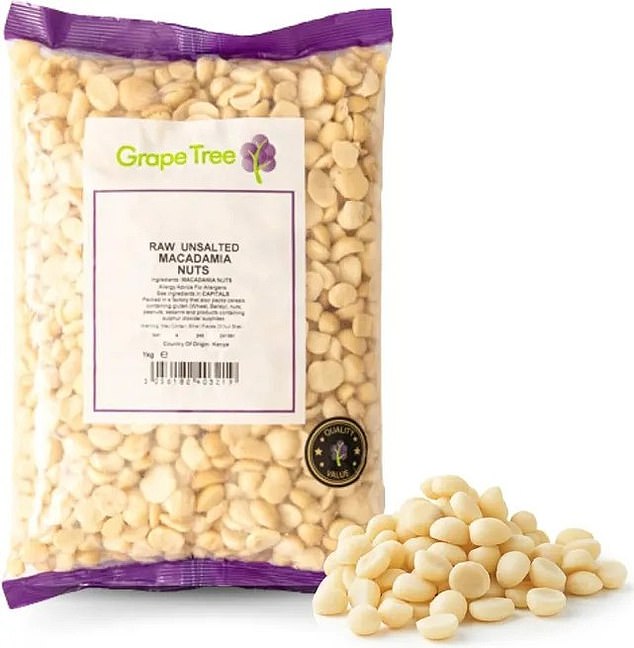A popular snack sold at Grape Tree has been urgently recalled over fears it may be contaminated with a potentially deadly bacteria linked to colon cancer.
The health food store stuck a ‘do not eat’ alert on batches of its raw unsalted macadamia nuts.
It is feared the sweet snack may contain traces of a rare strain of the diarrhoea-causing bug E.coli.
Known as Shiga toxin-producing E. coli (STEC), the pathogen typically also causes a fever. In the majority of cases, symptoms fade naturally within days.
However, for vulnerable populations, the infection can get into the blood and travel to the organs, causing catastrophic damage.
Last month, shock research also suggested E.coli—including STEC strains—may be to blame for a disturbing rise in colon cancer cases in under 50s.
Grape Tree said the recall only affected its 250g pack of the nuts, which have a best before date of July 11, 2026 and the batch code G41 5 101 250610.
The retailer added: ‘If you have bought Grape Tree Raw Unsalted Macadamia Nuts 250g, do not eat them.

The health food store Grape Tree stuck a ‘do not eat’ alert on batches of its raw unsalted macadamia nuts

Symptoms of Shiga toxin-producing E.coli include severe diarrhoea and vomiting, according to the UK Health Security Agency
‘Instead, check if you have bought the affected batch code and return the product to the store for a full refund, with or without a receipt.’
The Food Standards Agency (FSA), which published the alert, issues recalls when problems are spotted with food that means it should not be sold.
It also said: ‘Point of sale notices will be displayed in stores where the product was sold.
‘These notices explain to customers why the product is being recalled and tell them what to do if they have bought the product.
‘For more information, please email info@grapetree.co.uk.’
STEC can be spread by touching infected animals or their faeces directly, as well as coming into direct contact with infected people’s waste, for example in the case of carers looking after older people.
It can also be spread through contaminated water, either via drinking tainted supplies it or accidently ingesting it while swimming.
Last year more than 60 sandwiches, wraps and salads sold in 11 major shops in the UK were slapped with ‘do not eat’ alerts over fears they could contain STEC.

Bowel cancer can cause you to have blood in your poo, a change in bowel habit, a lump inside your bowel which can cause an obstructions. Some people also suffer with weight loss a s a result of these symptoms

STEC can be spread by touching infected animals or their faeces directly, as well as coming into direct contact with infected people’s waste, for example in the case of carers looking after older people
The outbreak sickened 288 patients, caused nine cases of haemolytic uremic syndrome (HUS), a life-threatening condition that can lead to kidney failure and two deaths.
Most of those sickened with the bug will get better without NHS care within a week, though symptoms can last up to a fortnight.
Health officials say taking antibiotics and antidiarrheal drugs is not generally recommended for STEC.
This is because of the potential of increasing the risk of suffering complications such as HUS, as the drugs’ impact on the bacteria can lead to an increased build-up of toxins.
A small proportion of adults who contract STEC may develop a similar condition called thrombotic thrombocytopaenic purpura (TTP).
But the increased spread of the bug is also concerning experts after research published last month suggested E.coli—including STEC strains—could be linked to a rise in colon cancer cases.
US scientists analysed the DNA of 981 colon cancer tumours in patients aged either under 40 or over 70, across 11 countries.
Experts found traces of colibactin, a cancer-linked toxin which is produced by certain strains such as non-0157 STEC, lurking in tumours from patients under 40.
Responding to the research, scientists acknowledged it was ‘strong’ and ‘good quality research’, but noted longer term studies tracking the effects of colibactin was first necessary.
This article was originally published by a www.dailymail.co.uk . Read the Original article here. .


